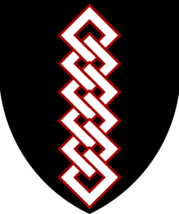Lowchurch: Difference between revisions
From MicrasWiki
Jump to navigationJump to search
(Created page with "'''{{PAGENAME}}''' is a bailiwick of the Sovereign Confederation. It is named for the affectionately named "Low Church", a repurposed subterranian military bunker complex...") |
No edit summary |
||
| (3 intermediate revisions by the same user not shown) | |||
| Line 1: | Line 1: | ||
'''{{PAGENAME}}''' is a bailiwick of the [[Sovereign Confederation]]. It is named for the affectionately named "Low Church", a repurposed subterranian military bunker complex made-successor to the old South Temple which was destroyed during the Goldshirean Civil War. | [[File:Lowchurch.png|thumb|214x214px|The bailiwick symbol of Lowchurch]] | ||
'''{{PAGENAME}}''' is a bailiwick of the [[Sovereign Confederation]]. It is named for the affectionately named "Low Church", a repurposed subterranian military bunker complex made-successor to the old South Temple which was destroyed during the Goldshirean Civil War. Lowchurch is defined by its majority Feynblwdish population and their ancient Goldshirean cultural heritage. During the de-partitioning of Holwinn, several property ownership disputes were resolved in favor of Sovereign parties, altering borders in certain rural areas along vast stretches of farmland. | |||
In 1712, the population was 202,167 | |||
[[Category:Sovereign Bailiwick]] | [[Category:Sovereign Bailiwick]] | ||
[[Category:Sovereign Confederation]] | [[Category:Sovereign Confederation]] | ||
Latest revision as of 21:14, 18 January 2023
Lowchurch is a bailiwick of the Sovereign Confederation. It is named for the affectionately named "Low Church", a repurposed subterranian military bunker complex made-successor to the old South Temple which was destroyed during the Goldshirean Civil War. Lowchurch is defined by its majority Feynblwdish population and their ancient Goldshirean cultural heritage. During the de-partitioning of Holwinn, several property ownership disputes were resolved in favor of Sovereign parties, altering borders in certain rural areas along vast stretches of farmland.
In 1712, the population was 202,167
